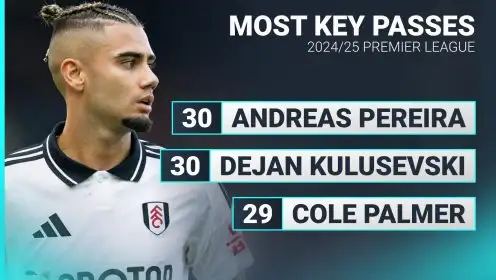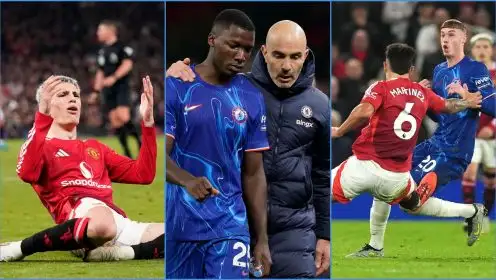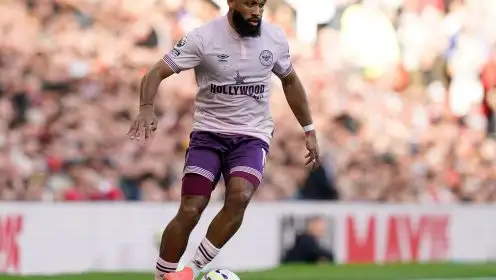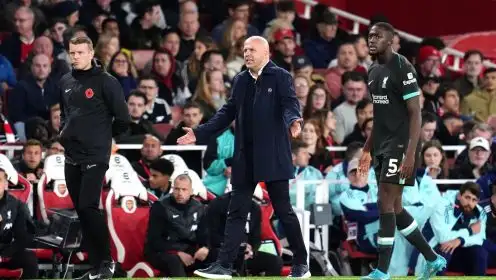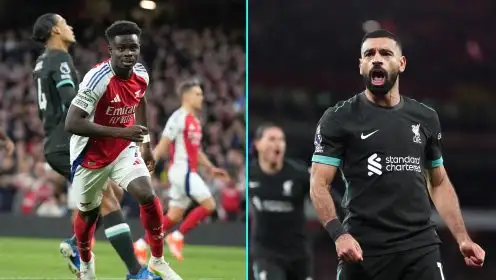16 Conclusions from Arsenal 2-2 Liverpool: Saka dazzles, Salah delivers, City have the last laugh
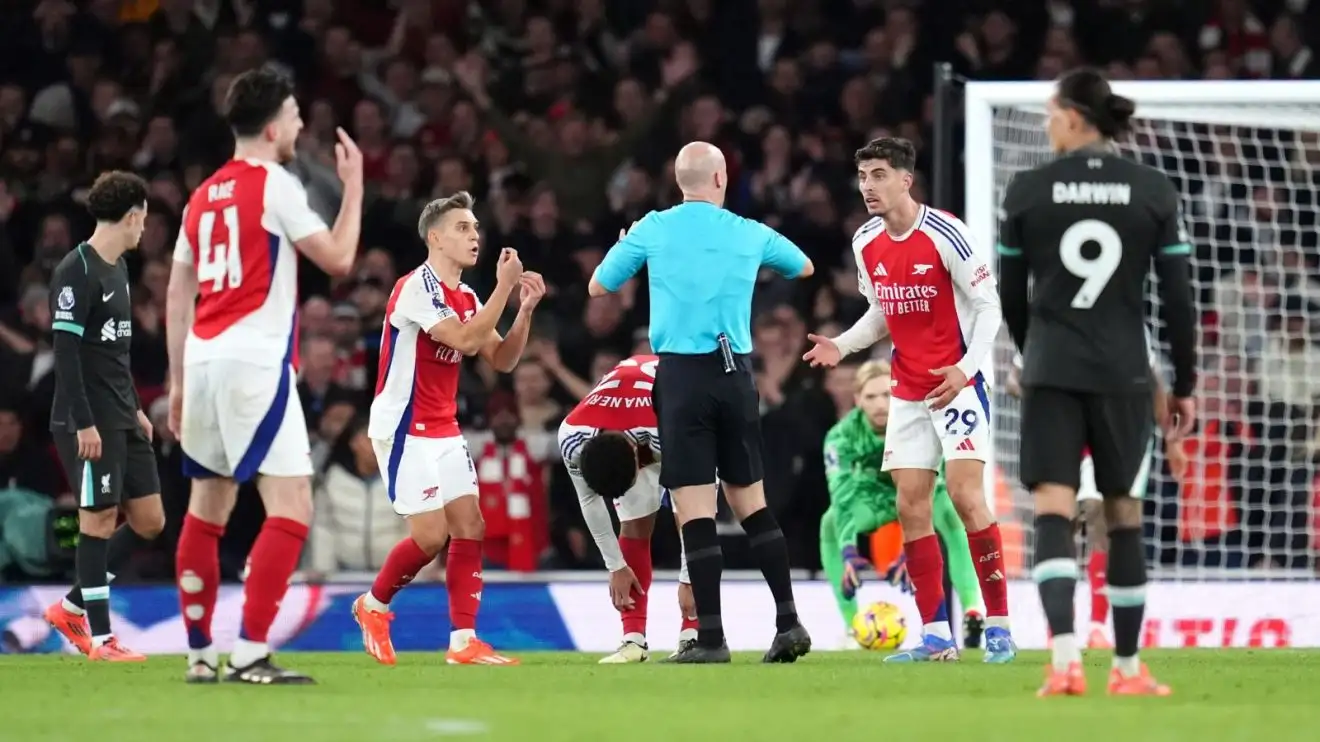
Lovely entertaining slice of top-tier Barclays at the Emirates. Arsenal and Liverpool both did an awful lot right and a few things irritatingly wrong – as did the officials – in a fine game that taught us plenty about two live and lively pretenders to Man City’s crown. Even if what it ultimately told us is that neither is likely to stop them winning a fifth straight title.
1. Premier League football is, increasingly, a game where 22 players run around for 90 minutes and in the end Manchester City always win.
It feels mildly irritating to make City the first port of call after this enormously entertaining 2-2 draw between Arsenal and Liverpool but there’s little doubt it is City who were the big winners from this clash between their two likeliest challengers. History tells us City are formidable front-runners and, despite failing to yet truly hit their stride this season, they now sit at its summit, a point clear of Liverpool and an already-significant five better off than the Gunners.
2. It’s always an interesting scoreline in this kind of fixture, is 2-2. It points to a certain type of game, one where almost inevitably both teams will leave it feeling like they could have won it while knowing, if they’re honest, they could also have lost it.
That absolutely feels like the case here. Both sides will know they’ve been in a fight with a significant direct rival after this, and neither can really feel too gloomy about dropping two points in such an all-out encounter.
Both teams had their spells of dominance of possession and territory, both teams will point to the periods of the game where they’ll feel they could have won it. Most significantly, it nearly always felt like those periods were a result of one team playing well rather than the other necessarily doing much collectively wrong.
3. But if there is one period of the game that will cause either side real regret, we’d suggest it would be for Arsenal in the time between their second goal and Liverpool’s second equaliser. There were mitigating factors in the apparent passivity Arsenal occasionally displayed in those moments. Liverpool, clearly, are not a team to be trifled with, and Arsenal lost the second half of their first-choice centre-back pair while Jurrien Timber – a doubtful starter all week – found it harder and harder to keep up with the pace of proceedings.
That, though, explains why Arsenal may have been a touch more cautious and seeking primarily to defend rather than extend their lead, but it doesn’t explain how poor their attacking football was in that period. Their few forays in those first 35 minutes of the second half were too frenetic, too manic. There comes a point where the speed of an attack tips from slick and flowing to slightly unhinged and Arsenal fell the wrong side of it. They created next to nothing while 2-1 up and Liverpool’s second equaliser was far less of a surprise when it arrived than appeared likely at half-time.
4. Let’s not pretend this was some calamity for Arsenal, though. The ‘injury-hit’ narrative was itself, well, hit by the starting XI Mikel Arteta was able to name with both Timber and most importantly Bukayo Saka in it but the finishing XI was rather more threadbare with Gabriel, Timber and Saka all departed.
True, Liverpool actually had more players out than their ‘injury-hit’ opponents but it would be disingenuous to pretend they are of equal import. Even the absence of Alisson Becker doesn’t hit Liverpool as hard as it would most clubs given the calibre of their number-two keeper.
5. Mikel Arteta had all but ruled Saka out of this one after he sat outs the awkward Champions League win over Shakhtar before unleashing him from the start. Classic Arsenal dark arts there, and there was certainly no hint of any injury in a mesmerising first half from the winger.
Arteta’s reluctance to play any football whatsoever without Saka is well known and pretty understandable, but you couldn’t help but wonder while watching this sensational first-half effort full of zip and mischief whether a niggly little two-week injury lay-off might in fact have been precisely what Saka needed.
He certainly looked fresher than he has for much of this season, and far more involved from open play than has sometimes been the case.
6. The opening goal was an absolute beauty. Much was made in the early Super Sunday game of Cole Palmer’s goal and ‘assist for the assist’ in the opening Chelsea goal coming in front of an admiring Gianfranco Zola in the crowd. And fair enough. But Saka’s outside-of-the-boot nutmegging of Andy Robertson followed by a finish that married cool precision with searing force coming in front of Dennis Bergkamp has to be a bit of a buzz too, doesn’t it?
It was a goal of deceptive simplicity in its execution, with Ben White’s first significant contribution on his return to centre-back being to release Saka to turn Andy Robertson inside out and give Caoimhin Kelleher no chance as the ball ripped past him. It’s absolutely no surprise to anyone now to see Saka produce this kind of brilliance, but it is precisely the kind of distinctive Saka brilliance that has been in slightly shorter supply this season.
There are few better or more enjoyable players to watch than Saka in this mood at this level, and while he faded a touch along with his team in the second half those first 45 minutes were an absolute masterclass.
7. These are worrying times, though, for Andy Robertson. He has been a mainstay of this brilliant Liverpool team for so long, but that is successive weekends on which he has looked wildly outmatched by his direct opponent. Noni Madueke gave him twisted blood last weekend in another high-level match and in that first half particularly today he had absolutely no answer to what was without doubt Saka operating somewhere close to his exhilarating best.
These are tough tests for sure, but a starting Liverpool full-back should not be getting this eye-wateringly exposed by that level of match-up.
He had to do better here for the goal, unable to slow himself down to make a meaningful attempt at a challenge as he raced desperately to try and get back in position.
While Robertson moved too fast for his own good, there’s also no escaping the fact that Virgil van Dijk moved too slowly, ambling back when his mate was in urgent need of assistance. Not sure he could have got there anyway, but an attempt would have been nice. It certainly didn’t look great.
MORE ON ARSENAL FROM F365:
👉 Liverpool and Arsenal leave promise of more intrigue to come in fascinating draw
👉 Star Arsenal sold in summer could ‘play for any team in the world’, with ‘great season’ coming
👉 Arsenal ‘need’ Real Madrid star who can become ‘absolute superstar’, according to legend
8. No doubting Virgil’s movement for the first equaliser, though. A double taste of their own medicine for Arsenal, not only conceding from a set-piece having failed to deal with the aerial prowess of <checks notes> Luis Diaz, but also falling for a little eyebrows near-post flick-on followed by a thumping headed goal that absolutely screamed Steve Bould and Tony Adams.
But just when it seemed like it really might be Jover for Nicolas, the heroic Arsenal set-piece tactician came up with the goods once more. His brilliant strategy on this occasion was to tell Declan Rice to deliver not one but two undefendable free-kicks into the Liverpool penalty area in quick succession.
Crucially, Mikel Merino was tasked with heading the second one beyond Kelleher and inside the far post after a second lazy leg of the afternoon from Virgil van Dijk played the entire Arsenal train onside.
9. While we’re here, we really do have little choice but to note the absurd amount of time it took for VAR to confirm the goal. Gary Neville had it sorted out after one replay and, while we’re not saying the actual decision should have been made quite that quickly we’re still at a loss to explain why it took a full three minutes to come to a conclusion that had never really appeared in any doubt from any of the replays that were shown.
Van Dijk’s blue boot always seemed to make him the last defender, and at no point did any Arsenal attacker – never mind an interfering one – appear to be beyond him.
We don’t, as you may know, generally have much time for Arsenal and their conspiracy theories, and of course taking 30 seconds too long to get the right decision is better than 30 seconds too few to get the wrong one, but it was surely possible to arrive at what was a quite straightforward decision far quicker than was the case here.
To add to the needless confusion, it was at some point during this interminable delay that a minimum of four minutes’ added time was announced. Ultimately, five added minutes were played. None of it really added up, none of it needed to take so long, and it was just the latest boring example that boringly forces us to boringly note that even when it doesn’t get things actively wrong, VAR still very often makes the game worse.
10. After some in-depth half-time analysis in the Sky Sports studio that found some time to discuss an excellently enjoyable and event-filled game of Premier League football in between the hard-hitting analysis of new Sky series Day of the Jackal, it was time for the second half.
Sure, we all enjoyed Roy Keane revealing to nobody’s great surprise that assassin is his dream job, but it did rather feel like another intrusion of frivolous non-football nonsense into the far more importantly world of actual football nonsense.
Arsenal’s second-half plan involved a note more caution than they showed in the first, even before Gabriel was forced off with Yet Another Injury for the Gunners.
At that point, their defence was in a bad way. Thomas Partey filling in at right-back and Ben White in a now-unfamiliar centre-back role were joined by the lesser-spotted Jakub Kiwior and a by now visibly wilting Timber. With a quarter-of-an-hour to play, he too made way for the precociously talented Myles Lewis-Skelly and handed over the always-simple task of keeping a lid on Mo Salah.
11. Arsenal’s patched-up defence were indebted at this time to the efforts of Rice and Merino in front of them. The pair had combined to such devastating effect to give Arsenal the lead and fought like giants to help them preserve it.
We’re used to seeing this kind of performance from Rice, of course, but Merino matched him. Between them they made five tackles and five interceptions, Merino edging the former 3-2 and Rice the latter.
12. Timber himself had done a brilliant job of keeping Salah relatively quiet but was surely never expected to complete 90 minutes given he had been such a doubt to feature at all, but it clearly lifted Liverpool as they redoubled their efforts to secure the equaliser.
That Liverpool equalised was no surprise, nor was the identity of Salah as its scorer given Arsenal’s defensive resources had been stretched beyond breaking point, but quite how the goal came about was still a surprise.
Trent Alexander-Arnold had endured a quiet game but is one of those players whose latent threat is never far below the surface. On most afternoons, his pass to release Darwin Nunez would be comfortably the best key pass to be seen. Cole Palmer may have him covered for that particular niche title, but it was still mighty fine.
But while it was excellent, it was hardly outside Alexander-Arnold’s standard modus operandi. What followed from Darwin Nunez absolutely was. As we all settled in and waited for him to blaze the ball into the sky, something rather strange happened. Instead of doing that, he calmly picked the correct option and squared the ball for Salah to complete the task. A brilliant counter-attacking goal, ripping Arsenal open in just a handful of seconds and even fewer touches.
13. At the risk of getting splinters in the old backside, it would be hard to argue it wasn’t a fair outcome. While Arsenal’s reduced state was unfortunate, Liverpool had controlled if not quite dominated the second half and were value for that equaliser.
Where Arsenal may wonder ‘What if?’ is in how much more threatening they appeared when once again forced into chasing the game after seeing their lead wiped out.
It’s easy in hindsight and from a distance to see these things, but was there a case here for Arsenal being more rather than less attacking given the limitations they were now operating under at the back? Was Arsenal’s best course of action an 11-man version of their attempt to shut City down at the Etihad? Was there nothing at all to be said for a bit more attacking intent.
Because when they did show it again in those closing minutes, it was once again they who appeared the likelier scorers of a winner when all logic by this stage pointed to Liverpool as the likelier victors.
14. Two incidents in those closing stages merit attention. The first was Gabriel Jesus’ ‘disallowed goal’. The scare quotes are there because it wasn’t really a disallowed goal, and that’s very much the first thing that needs stressing. Whatever the rights or wrongs of how it played out, it’s wrong to call it that. The whistle had blown and the game stopped several seconds before Jesus thrashed the ball home after Kai Havertz had somehow run it into the post. Most importantly, while Arsenal and Peter Drury hadn’t let the referee’s whistle stop them, Kelleher and at least three-quarters of the Liverpool defence had.
Which is, of course, why VAR couldn’t intervene and why Anthony Taylor probably shouldn’t have blown when he did. It was a flimsy-looking foul by Jakub Kiwior on Dominik Szoboszlai in a spot where, with Liverpool’s defence stretched, a decent chance was always likely to come from the Arsenal man edging that battle. Making the decision a few seconds later and allowing for VAR to cast a glance if necessary was surely the better course of action even on a weekend where VAR has been so spotty.
15. And yes, the very last action of the game should very obviously have been an Arsenal corner, with all the obvious threat that poses. Given Arsenal have lost points to Man City and seen Man City win another couple of points at Wolves from precisely such last-gasp corners, there is undoubted reason to be aggrieved at how neither referee nor linesman – both of whom were on the right side of the pitch and with seemingly decent lines of sight – could fail to see the ball quite obviously bounce off Kostas Tsimikas’ thigh and behind.
As a general rule, officials are wise to avoid taking players’ body language into too much account when making decisions, but when a defender makes such a concerted effort to keep such a ball in play, it’s probably a fair guess the last touch was theirs. A perplexing decision and one whose irritating wrongness is undeniably magnified by the time at which it happened.
It’s just lucky it happened to Arsenal, and thus will be calmly accepted by their fans as a bad but unremarkable human error and not evidence of anything insanely bafflingly sinister.
16. Even if it did ensure that once again Manchester City end the Premier League weekend laughing last and loudest.
